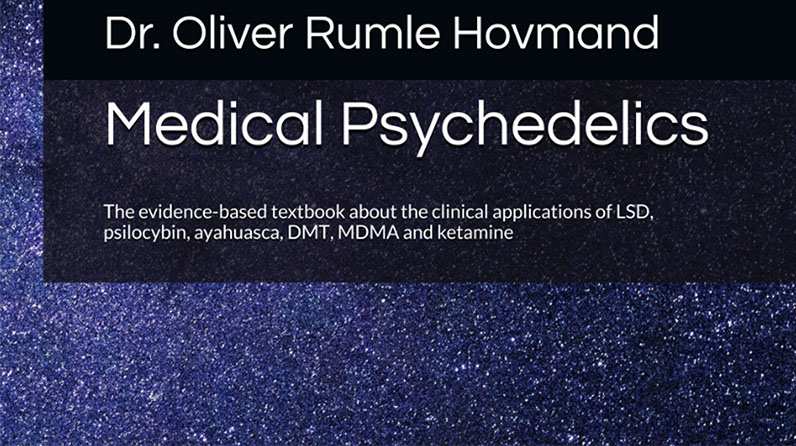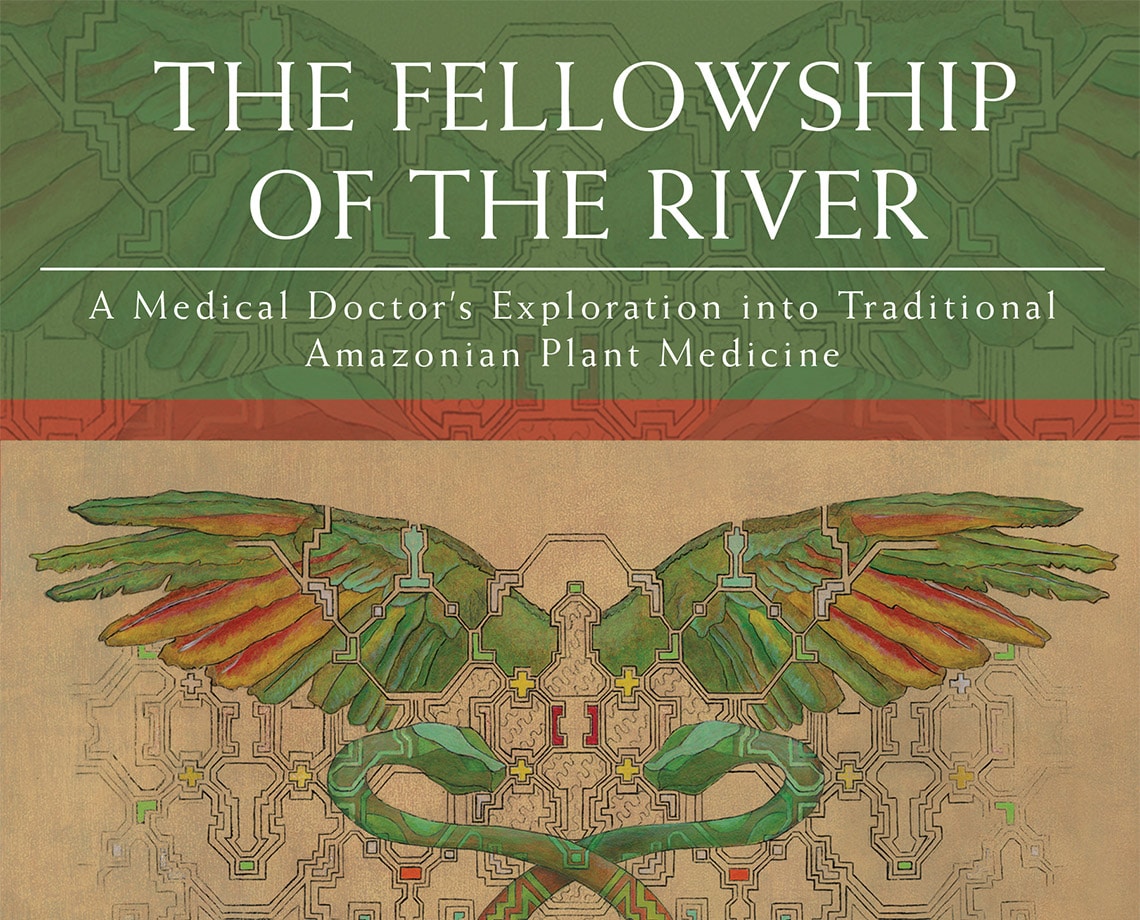Have you ever wondered where to find a reputable overview of psychedelic research? Maybe you’re a clinician with patients who would benefit from working with psychedelics and you want to read up on the latest research so you can feel confident implementing them into your practice. Or perhaps you are a well-seasoned psychonaut with an interest in learning about the scientific side of psychedelics. No matter your reasons for seeking out this information, look no further—the world’s first academic textbook covering this topic was published earlier this year.
Oliver Hovmand is a psychiatry resident in Denmark who decided to write Medical Psychedelics after realizing that although there have been plenty of psychedelic studies conducted over the past several decades, there has been an absence of academic textbooks available for people who want to study the existing body of psychedelic research. I spoke with Oliver about why having your own psychedelic experiences can help you to fully understand what has been reported in the research, about the factors that helped him decide which studies to include in his textbook, and about how he plans to keep the book updated moving forward.
Thanks for taking the time to speak with me today, Oliver. What is your background and how did you get interested in psychedelics?
After high school I went to medical school, which I finished two years ago. Now I have an internship in psychiatry in order to make it my specialty. I have been interested in psychedelics for the last four or five years, and I’m interested in non-ordinary states of mind and how we can achieve them. I got into a group that has an interest in psychedelics and then I tried them myself and found them really interesting. So I started to study the medical literature of psychedelics, which was beginning to develop back then. And I just kept developing more of an interest in them. Then back in medical school, I wrote my masters thesis on MDMA as a possible treatment for PTSD. There was a lot of media focus on that paper and that attention helped me realize that we sort of needed a textbook on psychedelics, which I decided I wanted to write.
That’s cool. I enjoyed reading your book. It’s the first academic textbook of this type?
Yes, that’s right.
Have you found that your experiences with psychedelics have benefitted you in any particular ways?
My experiences gave me a personal understanding of what I have read in the medical literature. It has been a lot easier trying to understand the literature now because of course a psychedelic experience is the kind of thing that you can’t understand until you try it.
That’s very true.
I think that if I hadn’t read the literature, I wouldn’t understand what it was talking about. Other than it has specific effects like raising your heart rate or something else along those lines. But I wouldn’t think that I would understand so much about it if I hadn’t tried psychedelics myself.
Personal experience with psychedelics can go a long way toward helping us understand them better. Is that what inspired you to write this book?
Well, I saw that there was a gap and I wanted to contribute, but I also wanted to write this book as a means for my personal growth because I wanted to know everything there was to know about psychedelics and I figured that this was a good way to educate myself. Then also I figured that if I ever wanted to go for a PhD, it would be a good jumping off point in terms of financing that goal.
In what way?
Well, because I think that writing this textbook has made me one of the people in the field who knows the most about them from a medical point of view, and that knowledge would make me more credible if I ever wanted to ask for funds.
That makes sense—it will probably go a long way to be the first person to have ever written an academic textbook on the topic.
I also felt that it was very important to write this book because I believe that during my career psychedelics will play a huge part in psychiatry. Right now there is a lot of evidence, but it is hard to find because it’s scattered throughout the medical journals and the Internet. I wanted to present the evidence as a textbook so that people could have access to the current body of research in one place, and I plan to update the textbook regularly to show how much the evidence is growing year by year.
That’s awesome. I really appreciate your work and I’m sure that I’m not alone. We do need to have a textbook on medical uses for psychedelics available for clinicians and researchers.
I think psychedelics will return to clinical practice in 5-10 years, and when that happens doctors and psychiatrists will need somewhere to learn about psychedelics and their medical use. I hope that in five years Medical Psychedelics will be the textbook to go to if you want to prepare yourself to use psychedelics in a medical practice.
The book focuses on a few different psychedelics—LSD, psilocybin, ayahuasca, DMT, MDMA, and ketamine. Why did you choose those specific substances to cover in the book?
Simply because those substances have been researched for clinical use. There are lots of other psychedelic substances but there hasn’t been any clinical research done on them. The only studies conducted on other psychedelics were safety studies and animal studies—there hasn’t really been any research into the therapeutic prospects of those drugs. So that’s why I chose to focus on the drugs that I did in the book.
So Medical Psychedelics is the first edition of what you hope to be multiple editions of the book?
Yeah, I plan to make an update in April.
Well that’s coming up mighty soon—are you actively working on that now?
Of course! I’m working on it as we speak.
What kind of updates are you planning to include in the next edition?
I’m planning to include all the clinical research that has been published during the last year, which is about 10 or 15 studies. And I will also be removing some unnecessary text from the first edition—making some passages shorter, that sort of thing. Concerning the MDMA chapter, a meta-analysis of MDMA studies was published earlier this year, so that will make its way to the MDMA chapter in the next edition.
What do you think is your target audience for the book? Who would be most interested in reading it?
I think the audience for this book consists of people like us, who are just generally interested in psychedelics. The average guy who is interested in psychedelics and wants to learn some more, but also people who think it’s helpful to speak about psychedelics from a scientific standpoint and maybe not as much from a spiritual or recreational standpoint.
So your book is really for someone who wants to have an evidence-based argument about psychedelics rather than a recreational or spiritual argument. Personally I think there are also valid arguments for those use cases, but I’m also in favor of having strong scientific evidence to back up any type of pro-psychedelic argument.
Yes, and also I think this book is good for psychologists and medical professionals working in psychiatry who have seen the evidence from the mainstream news sources and really want to dive into the evidence and learn more.
Well, I think what you’ve put together with the first edition of Medical Psychedelics is a great start, and I can definitely see where it would come in handy for anyone who wants to learn more about the clinical uses of psychedelics. Thanks for your time today, Oliver.
My pleasure. Thank you for talking with me.
We are grateful to Oliver for speaking with us. You can follow him on Instagram and purchase his book Medical Psychedelics by clicking here.












Great news! I’m looking forward to the next edition of Medical Psychedelics!